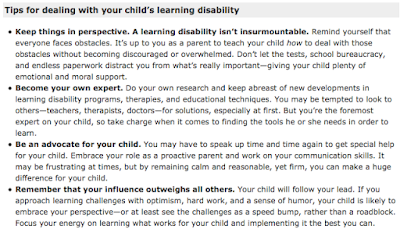(10) Specific learning disability —(i) General. Specific learning disability
means a disorder in one or more of the basic psychological processes
involved in understanding or in using language, spoken or written, that
may manifest itself in the imperfect ability to listen, think, speak,
read, write, spell, or to do mathematical calculations, including
conditions such as perceptual disabilities, brain injury, minimal brain
dysfunction, dyslexia, and developmental aphasia.
General Characteristics: *Not all students will exhibit these characteristics*
- academic problems
- disorders of attention
- poor motor abilities
- psychological process deficits and information-processing problems
- lack of cognitive strategies needed for efficient learning
- oral language difficulties
- reading difficulties
- written language problems
- mathematical disorders
- social skill deficits
Learning disabilities are heterogeneous group which means they are a diverse group of individual. These children exhibit potential difficulties in many different areas. One child could have difficulty in reading but do very well in math, while another child could be the complete opposite. It's hard to write down strength and abilities because they greatly vary from individual to individual.
Needs: (Found in Chapter 5 page 180 of text)
- Help students develop organization skills.
- Establish set of rules for academic and social activities and tasks.
- Individualize instruction; be sure the reading level is appropriate.
- Begin lessons with advance organizers.
- Supplement oral and written assignments with learning aids (computers).
- E-textbooks
- Modify tests, allowing the student to take more time or complete the test in a different way (listen to a tape of the test).
- Etc.
- Abbreviation Expanders - use with word processing, these software programs allow a user to create, store, and re-use abbreviations for frequently-used words or phrases. This can save the user keystrokes and ensure proper spelling of words and phrases he has coded as abbreviations.
- Audio books - Recorded books allow users to listen to text and are available in a variety of formats, such as audiocassettes, CDs, and MP3 downloads. Special playback units allow users to and search and bookmark pages and chapters. Subscription services offer extensive electronic library collections. (I actually have a whole blog post dedicated to audio books which you can find here)
Resources:

No comments:
Post a Comment